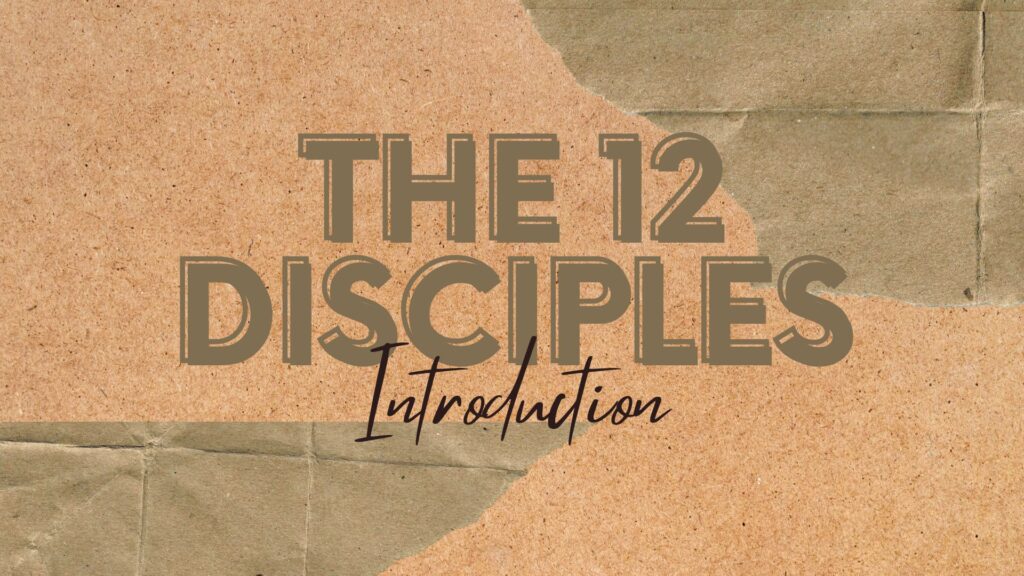Physical Address
304 North Cardinal St.
Dorchester Center, MA 02124
Physical Address
304 North Cardinal St.
Dorchester Center, MA 02124
With Michael Walker
With Michael Walker

To Whom it may Concern…

When we examine the names of the apostles in their original context, we are confronted with a reality that has been intentionally buried under centuries of cultural appropriation and manipulation. This was not a benign effort at translation; it was a wholesale rebranding of identity. The Greco-Roman “Catholic” (meaning universal or according to the whole A.K.A. “The Roman Universal Church of Christianity.”) Church, the institution that invented the religion we now call Christianity, understood that a faith grounded in its Hebrew roots would never be easily controlled by an empire hungry for power. So they anglicized, Latinized, and Greekified the names of Yehoshua and His apostles, stripping away their heritage, culture, and identity. Imagine someone deliberately calling you by a foreign name—not out of ignorance, but out of an intent to assimilate you, to erase who you are so their narrative could thrive without resistance. This is exactly what they did, and the evidence is undeniable.
Shim‘on (שִׁמְעוֹן), whom we know today as Simon Peter, is the first and most obvious example. His Hebrew name meant “he has heard,” but Yehoshua Himself renamed him Kēphas (כֵּיפָא) in Aramaic, meaning “rock.” The Greeks converted Kēphas into Petros (Πέτρος), and today, we know him as “Peter,” a name that carries none of the original cultural or covenantal weight. This stripping of context was not accidental. By erasing the Hebrew name, they erased the layers of meaning embedded in it—covenant identity, prophetic significance, and heritage.
Andreas (Ἀνδρέας), or Andrew, was Simon Peter’s brother. His name was already Greek, meaning “manly” or “brave,” which made him more palatable to the Roman world. No Hebrew equivalent is recorded, which shows how the narrative began shifting from its origins even before the institutional takeover.
Ya‘aqov ben Zavdai (יַעֲקֹב בֶּן-זַבְדַּי), the brother of John, was renamed James by the translators. This is egregious because there is no linguistic bridge between Ya‘aqov and James. Ya‘aqov is Jacob—the same Jacob of Israel’s line. But by renaming him James, they severed the link between the apostles and the patriarchs, sterilizing the connection to Israel’s story.
Yochanan ben Zavdai (יוֹחָנָן בֶּן-זַבְדַּי), the brother of James, became John. His name, meaning “Yahweh is gracious,” carried the name of God within it, but the anglicized version diluted this powerful tie. The intent was clear: erase the identity that tethered the early church to the Hebrew covenant.
Philippos (Φίλιππος), or Philip, had a Greek name meaning “lover of horses.” Because his name was already culturally palatable, no changes were necessary. His presence further legitimized the idea of shifting the entire identity of the faith away from its Jewish roots.
Bar-Talmai (בַּר-תַּלְמַי), known as Bartholomew, had an Aramaic/Hebrew name meaning “son of Talmai.” He is often associated with Nathanael, though this connection remains debated. The flattening of his identity into a Greek-friendly name removed the familial depth embedded in his original name.
T’oma (תּאוֹמָא), or Thomas, means “twin” in Aramaic. He was also called Didymos (Δίδυμος) in Greek, which carries the same meaning. But the Greek version became dominant, diminishing the authenticity of his original heritage.
Mattityahu (מַתִּתְיָהוּ), the author of the Gospel of Matthew, means “gift of Yahweh.” Yet he was also called Levi, a name that aligned him with the priestly tribe. Both names testify to his Jewish identity, but today, “Matthew” has been so anglicized that its meaning is often ignored.
Ya‘aqov ben Chalfai (יַעֲקֹב בֶּן-חַלְפַּי), or James son of Alphaeus, is another tragic example of linguistic erasure. Again, his Hebrew name was Jacob, but the translators insisted on James—a manufactured name that divorced him from his ancestry.
Thaddaios (Θαδδαῖος), or Thaddaeus, is also called Lebbaeus in some manuscripts. But Luke identifies him as Yehudah (יְהוּדָה) son of James. Yehudah means “praise,” but the English “Jude” or “Thaddaeus” fails to capture this. This renaming has allowed the Catholic institution to obscure the fact that Yehudah shares his name with Judah, the patriarch from whom the Messiah’s lineage descends.
Shim‘on ha-Kana‘ni (שִׁמְעוֹן הַקַּנָּנִי), or Simon the Zealot, was distinguished by his zeal. The Hebrew word qanai means zealous, but the translators rendered it “Canaanite,” confusing readers and disconnecting the word from its true meaning.
Yehudah Ish-K’riot (יְהוּדָה אִישׁ-קְרִיּוֹת), known as Judas Iscariot, was the betrayer. His name means “praise,” and “Iscariot” likely means “man of Kerioth.” Even here, the depth of meaning was overshadowed by the transliterations that made the name easier to digest for non-Hebrew speakers.
After Judas’ death, Matthias (Μαθθίας) was chosen by lot to replace him. Matthias is a Greek form of Mattityahu, meaning “gift of Yahweh.” Yet again, the original Hebrew was displaced by a Hellenized form.
This deliberate rebranding was about more than names; it was about control. By erasing the Hebrew heritage from the foundational figures of the faith, the Greco-Roman Catholic Church distanced the faith from Israel, making it more palatable to pagan Rome. They severed the lineage, detached the covenantal significance, and created a faith that could be weaponized for empire. They wanted the Gospel to look, sound, and feel Roman, so they renamed everything and everyone until the original culture was unrecognizable.
This is why the names of Yehoshua and His apostles were changed. It was never about helping people pronounce the names. It was about reshaping the faith into something the Roman Empire could wield as a tool of dominance. By stripping away the Hebrew roots, they erased the narrative of a covenant-keeping God who fulfills His promises through Israel. This allowed them to position their institution as the sole authority, convincing the masses that salvation flowed through their system.
The tragedy is that millions today are still living under this deception. We recite anglicized names, sing songs to a whitewashed Messiah, and call ourselves by labels invented by the very system that betrayed the Way. But the truth is rising again. The original names matter because they tether us back to the reality that the Gospel is not a Greco-Roman invention—it is a Hebrew covenant fulfilled by Yehoshua the Messiah.
The question now is this: will we continue calling Him by the name the empire gave Him, or will we reclaim the name He was given by His Father? The names of the apostles remind us that our faith was never meant to be comfortable for empires. It was meant to be a fire that could not be controlled.